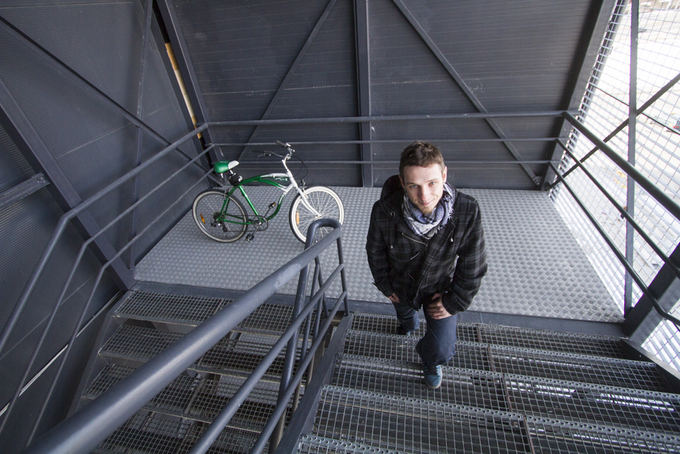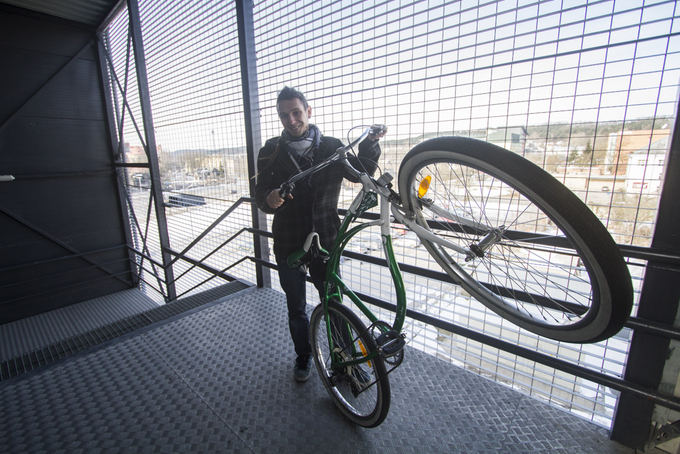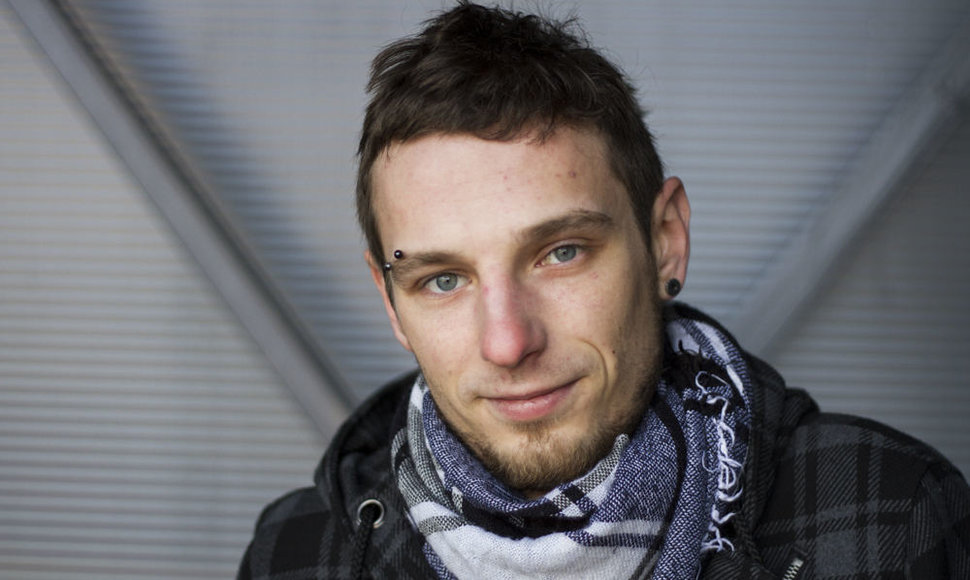Martynas, who was born in the Lithuanian resort town of Druskininkai, has not spent a single day off without a bike. So when it came to thinking about a business, it was clear that the idea must have something to do with cycling. “It is my hobby. I like riding but also to fiddle, to fix if something is broken – it is something I know how to do and am good at,” Martynas says. As a proof, he extends his hands that show traces of hours spent in a garage.
Risk: If not now, when?
Suraučius's enthusiasm managed to convince the jury at the “Captains of the Seven Seas” project. “I simply have great faith in my idea,” says the young man who is now in the process of setting up a company.
Paperwork is almost done and he expects to start operations sometime in May.
The idea is to open several bike repair points that will offer a range of services – from a simple change of punctured tyre to a full check-up before a new cycling season, an overhaul both technical and aesthetic.
Suraučius wants to be as close to his clients as possible, so he plans to situate his service points in central parts of the town. If need be, he can also provide mobile services or come to collect the client's bike at home.
“This is the kind of services offered by existing providers on the market. We, however, will be offering one extra thing that our competitors do not have. And this will give us an edge. But I cannot talk about it just yet,” Martynas hints.
Is he not afraid to enter the market that is already full of competitors offering comparable services?
“I am scared as hell. What if I fail? But I can handle the risk today – when if not now? It would be more complicated if I had a family – in that case, I'd need security and financial stability,” he says.
 |
| Mato Dauginio nuotr./Martynas Suraučius |
Thorough market research
Martynas says his decision to start a business in Vilnius is based on thorough research – the Lithuanian capital has the biggest cyclist community.
He has spent ten months polishing his business idea, scouting the market, visiting centres run by future competitors, asking them how their business is doing, if they have enough clients, how many people come every day. “But you cannot learn such things without actually starting a business. One says he has plenty of work, others try to evade the question: 'It depends...' I have realized that everything comes down to the skill of individual repairmen, the quality of service, and accessibility.”
In 2008, when everyone was already talking about the looming financial crisis, 90 thousand new bikes were sold in the country. When the downturn actually hit, the market contracted considerably, but in recent years, it has been showing signs of recovery. In 2011, 30 thousand new bikes were sold, in 2012, 34 thousand.
Demand for used bikes is much bigger. “So in the future, in addition to technical servicing, I am planning to offer used bike restoration services, including assembly and design,” Suraučius volunteers.
Clients reluctant to get their hands dirty
During summer season, on the last Friday of each month, cyclists' campaign “Critical Mass” halts car traffic in central streets of Vilnius. A column of several thousand bikes drive across the town, testifying to the growing popularity of cycling with Lithuanians.
 |
| Mato Dauginio nuotr./Martynas Suraučius |
Does Martynas see them as potential clients?
“Oftentimes, a handy cyclist likes to fiddle with his bike. But there are more and more people who do not want to get their hands dirty or spend so much time, so they'd rather seek professional assistance. Besides, not everyone is in possession of special tools or spare parts needed to mend a bike,” he explains.
Suraučius is certain that people's attitudes regarding bike maintenance is gradually changing – they do not just pay attention to it once their bike breaks down, but inspects it periodically, before each cycling season.
“For example, still quite few people know that the chain wears – so they replace it relatively seldom. Yet if one cycles intensively, the chain should be replaced every season – otherwise, sprockets will wear too and one day, you'll have to replace entire chainsets,” Suraučius explains.
In Vilnius, it costs some 50-60 litas (15-18 euros) to fix up a bike for a new season.
Tangible problem
To kick off his business, Suraučius requires at least 60 thousand litas (17 thousand euros). Most of it will be provided by the Angel Investors Fund and a few private individuals.
What made seasoned entrepreneurs believe in Suraučius' project – seemingly simple and hardly game-changing? Ilja Malkin, “Captains of the Seven Seas” coordinator, explains that priority was given to bicycle servicing projects because they would solve a very tangible problem.
“Recently, we've noticed very many start-up businessmen who seek investment to solve problems that are half-imagined or might only arise sometime in the future. It is obvious that bike use in Lithuania is growing in leaps. Demand for maintenance services is great and the market is far from saturation point,” Malkin believes.
Moreover, he says, not every cyclist is willing to entrust his or her vehicle to just anyone – to take it to a dirty garage and give it to a shabby and impolite repairman.
“By contrast, in this venture, effort will be made to create an attractive image for the service. Just like any other service, this one, too, needs to have a standard of quality, something to be aspired to. If I asked you, who is the standard bearer in bicycle maintenance business, would you be able to reply? And if I asked the same question regarding fast food? You'd probably say McDonald's, because it is a brand with a business philosophy, standards, quality customer service, etc. We'll seek to raise the bar in bicycle maintenance, too,” Malkinas explains.
Selling a style
What about the other side of Suraučius's idea? Bike restoration is a way to create added value. It is a niche service, however, so an entrepreneur should only venture into it once he or she has earned client trust.
“Starting with niche services would mean making your life difficult – since they are not the ones that help maintain money flow. So we suggest Suraučius start with services that are in demand and can build a stable foundation. Once that is in place, one can experiment with niche offers,” Malkinas says.
Meanwhile Suraučius's own thoughts are already far ahead. He is dreaming of designing and assembling customized fixies – fixed-gear bicycles.
“One of my main future goals is to sell a style. But that is a very investment-intensive ambition, while investment return prospects are somewhat obscure – such bicycles are expensive and it is not certain that there will be a demand for them in Lithuania. So I need to wait a little more,” Suraučius says.













